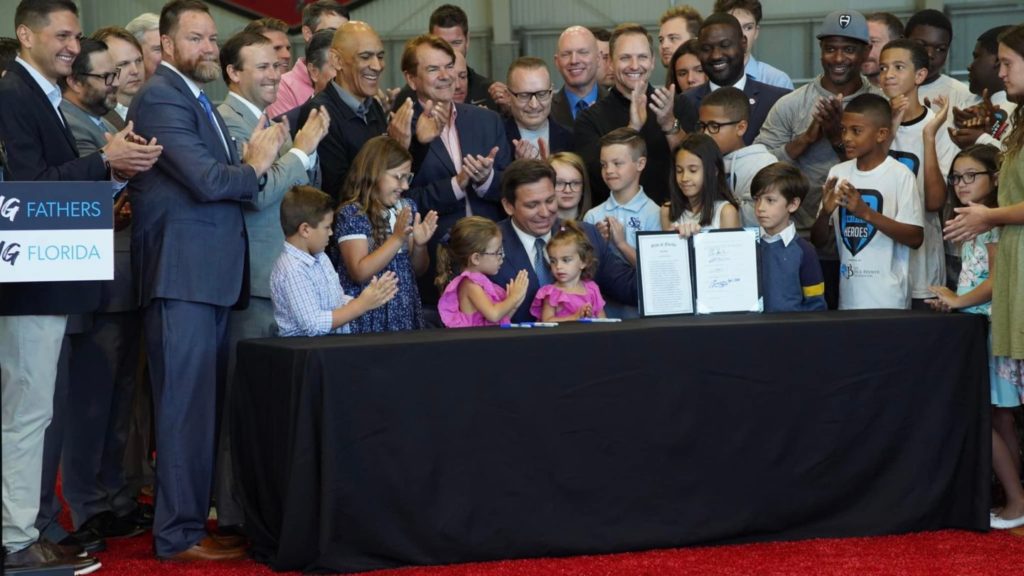Florida, Texas allocate record funding for programs supporting adoptive, foster families, expectant mothers
(The Center Square) – As Michigan’s Democratic Gov. Gretchen Whitmer vetoed funds for adoption, describing the funding as anti-choice, the Republican governors of Florida and Texas have allocated…

(The Center Square) – As Michigan’s Democratic Gov. Gretchen Whitmer vetoed funds for adoption, describing the funding as anti-choice, the Republican governors of Florida and Texas have allocated a record amount of funding to support adoptive and foster parents, low-income families and expectant mothers.
While exercising her line-item veto power to sign the state’s $77 billion budget this week, Whitmer vetoed $21 million she says was allocated for “anti-choice” programs. These include $10 million for marketing programs about adoption, $2 million in tax credits for adoptive parents, $3 million for a “maternal navigator pilot program,” $1.5 million for pregnancy resource centers and $700,000 for a nonprofit pregnancy center.
Her spokesperson issued a statement saying the governor didn’t support allocating “millions in taxpayer dollars to fake health centers that intentionally withhold information from women about their health, bodies and full reproductive health.”
Eric Ventimiglia, executive director of conservative group Michigan Rising Action, told The Center Square before the veto that Whitmer’s actions go beyond being pro-choice.
“Democrats like Governor Gretchen Whitmer have hollowed out the meaning of pro-choice, and replaced it to mean ‘pro-abortion only,’” Ventimiglia said. “Whitmer is no longer hiding her unwillingness to support reasonable assistance for women. Whitmer is hurting women and new mothers by eliminating millions in funding that provide real choices to women and families.”
Whitmer last week vetoed in the education portion of the bill $1 million to support pregnant and parenting support services for students and $5 million for research grants for universities that don’t use stem cells from aborted babies.
Others have expressed bewilderment about not supporting parents who choose to adopt by offering tax credits.
By contrast, Florida and Texas are allocating record funding to support adoptive and foster parents and expectant mothers.
Florida has allocated the greatest amount of funding in state history to help adoptive and foster parents, including those in law enforcement and an unprecedented $70 million statewide fatherhood initiative.
This week, First Lady Casey DeSantis announced even more funding and resources to support adoptive and foster parents in Florida. She announced $35.5 million from the state budget was supporting nearly 59,000 families with a one-time payment of $450 per child, including foster families.
“We are going beyond government by bringing community partners to the table to meet the needs of foster and adoptive families under the umbrella of my Hope Florida – A Pathway to Prosperity initiative,” she said. “I am on a mission to make sure that no child in Florida goes without hope, happiness, and a home. That means doing everything we can to support those who have stepped up and welcomed these children into their homes, as well as local partners that are already lending families a helping hand.”
Four months earlier, she’d announced the results of the state’s revamped and relaunched Pathway to Prosperity program: after nine months it had served over 25,000 people.
In April, Gov. Ron DeSantis signed a bill into law dedicating an additional $44 million to support Florida foster families. It increased monthly payments for care givers and monthly subsidies for childcare. It also expanded postsecondary education waivers for foster children and those who’d aged out of the system. It also expanded a program that has since 2019 added more than 4,000 foster families who are providing homes to children in need.
Florida’s budget also allocated direct payments for law enforcement officers who adopt children through the state’s child welfare system of $10,000 per child and $25,000 for children with special needs.
Meanwhile, in Texas, more than $100 million has been dedicated to its Alternatives to Abortion program. It promotes childbirth and provides support services to pregnant women and their families, adoptive parents, and parents who have experienced miscarriage or the loss of a child.
The state launched FamilyResources.texas.gov to provide a range of free or low-cost services available to Texans through state agencies. They include assistance with pregnancy care, adoption services, health insurance, parenting classes and a range of resources, child support, childcare, financial assistance for food, housing and utility expenses, among others.
“Texas state agencies are here to support you and your family before, during, and after pregnancy,” the website states.
Abbott said, “The State of Texas will continue providing care and assistance to women and families as they seek support during this important time in their lives. Everyone should feel supported when caring for their loved ones and growing families.”
He also recently signed bills into law extending Medicaid coverage for six months post-partum and appropriated $345 million for women’s health programs.



